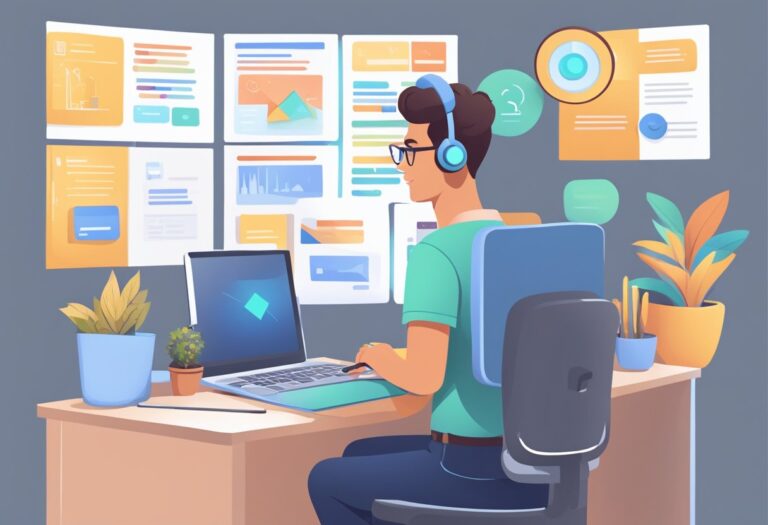Artificial Intelligence has quietly woven itself into our daily lives, transforming the way we shop, relax, and manage our homes. When you browse streaming services or e-commerce platforms, AI algorithms quietly analyse your preferences to suggest what you might enjoy next. Voice assistants like Alexa and Google Home have become our digital companions, responding to our commands to control lighting, play music, or answer questions.
AI technology is revolutionising critical sectors beyond entertainment, with healthcare benefiting from improved diagnostic capabilities and accelerated drug discovery processes that are saving lives daily. The medical field has seen remarkable advancements through AI-powered tools that can detect diseases earlier and develop treatments faster than traditional methods. Meanwhile, our journeys are becoming smarter and safer through AI navigation systems and autonomous vehicles that promise to transform transportation in the coming years.
Key Takeaways
- Artificial intelligence enhances everyday experiences through personalised recommendations and smart home solutions that respond to our unique preferences.
- Healthcare is being transformed by AI-powered diagnostics and drug discovery techniques that improve patient outcomes and treatment options.
- Transportation systems are becoming more efficient and safer with AI navigation and autonomous vehicle technology reshaping how we travel.
Emerging AI Technologies in Daily Life

Artificial intelligence is reshaping our everyday experiences in profound ways. Today’s AI systems understand our preferences, manage our homes, improve our healthcare, and enhance how we shop online – making technology more intuitive and personalised than ever before.
Voice Assistants and Smart Home Integration
Voice assistants have become ubiquitous companions in millions of homes. AI-powered smart assistants like Google Assistant use natural language processing to understand complex commands and questions.
These systems learn from interactions, becoming more attuned to individual speech patterns and preferences over time. The integration with smart home devices has transformed how people control their living environments.
With simple voice commands, users can:
- Adjust lighting and temperature
- Lock doors and monitor security cameras
- Control entertainment systems
- Set timers and reminders
- Receive news and weather updates
Home automation systems now connect dozens of devices into seamless networks that anticipate needs. The technology has become particularly valuable for elderly or disabled individuals, providing greater independence through accessible controls.
Advancements in AI Healthcare
Healthcare has experienced a remarkable transformation through AI technologies. Advanced machine learning systems now assist medical professionals in diagnosing conditions with greater accuracy than previously possible.
AI excels particularly in analysing medical imaging, often detecting subtle abnormalities that human eyes might miss. This capability is proving invaluable for early detection of serious conditions like cancer.
In drug discovery, neural networks analyse molecular structures and biological interactions at unprecedented speeds. This has accelerated the development timeline for new medications from years to months in some cases.
Personalised treatment plans represent another frontier, with AI algorithms examining patient data to recommend tailored approaches. These systems consider genetic factors, lifestyle variables, and treatment histories to optimise outcomes.
Telemedicine platforms increasingly incorporate AI for preliminary assessments and monitoring, expanding healthcare access to underserved populations.
AI Innovation in Streaming and E-commerce
The entertainment and retail landscapes have been revolutionised by AI-driven personalisation. Streaming platforms like Netflix and Spotify employ sophisticated recommendation engines that analyse viewing or listening patterns to suggest content aligned with individual tastes.
These systems evaluate hundreds of variables, from genre preferences to viewing times, creating highly tailored experiences. The technology has fundamentally changed how people discover new content, often leading them to shows or music they wouldn’t have found otherwise.
In e-commerce, AI similarly transforms the shopping journey. Online retailers leverage machine learning to offer personalised product recommendations based on browsing history, purchase patterns, and demographic information.
Behind the scenes, AI optimises inventory management and implements dynamic pricing strategies. These systems can predict demand fluctuations, reducing waste and ensuring popular items remain in stock.
Visual search capabilities now allow shoppers to find products by uploading images rather than typing descriptions, creating a more intuitive experience.
AI Transforming Mobility and Transport
Artificial intelligence is revolutionising the transportation sector, making journeys safer, more efficient, and increasingly personalised. These technologies are changing how we navigate cities and transforming the vehicles we use.
AI in Vehicle Automation and Navigation
The development of autonomous vehicles represents one of the most visible applications of AI in transport. Self-driving cars use complex machine learning algorithms to interpret their surroundings and make driving decisions in real-time.
Navigation apps now offer more than simple directions. They use predictive analytics to suggest optimal routes based on current traffic patterns, weather conditions, and historical data.
AI-powered traffic management systems are reducing congestion in urban areas. These systems analyse data from cameras and sensors to adjust traffic signals dynamically, easing bottlenecks during peak times.
The technology behind this revolution relies on deep learning models that can process massive amounts of visual data. These systems identify pedestrians, road signs, and potential hazards faster than human drivers.
Predictive maintenance is another benefit, with AI systems monitoring vehicle components to identify potential failures before they happen. This increases safety and reduces unexpected breakdowns.
AI’s Role in Future Mobility Solutions
AI is reshaping urban planning through the development of smart cities. Transportation networks are becoming more interconnected, with vehicles communicating with infrastructure and each other.
AI-powered logistics systems are revolutionising how goods move around the world. Companies use AI to optimise delivery routes, predict demand, and reduce emissions.
Mobility as a Service (MaaS) platforms are emerging, offering seamless integration of various transport options. These services use AI to suggest the best combination of walking, cycling, public transport, or ride-sharing.
The environmental impact of transport is being addressed through AI systems that optimise fuel consumption and traffic flow. This helps reduce the carbon footprint of urban mobility.
Public transportation benefits from AI through improved scheduling and maintenance. Buses and trains can be deployed more efficiently based on predicted passenger numbers.
New vehicle types, including AI-controlled drones, are expanding delivery options in congested urban areas, making last-mile delivery faster and more efficient.
Frequently Asked Questions
Artificial intelligence has integrated deeply into our daily lives through various applications that make things more convenient, personalised, and efficient. Let’s explore some common questions about how AI is changing our world.
How are streaming services utilising artificial intelligence to tailor viewing suggestions to individual tastes?
Streaming platforms analyse viewing habits to create personalised recommendations that keep viewers engaged. These AI-powered systems track what you watch, when you watch, and even when you pause or rewind.
The algorithms consider factors like genre preferences, watching duration, and ratings you’ve given to suggest content you’re likely to enjoy. This same technology extends to e-commerce platforms, which recommend products based on browsing history and purchase behaviour.
In what ways can voice assistants integrate with smart home technology to enhance everyday living?
Voice assistants can control multiple connected devices through simple verbal commands. You might ask your assistant to adjust the thermostat, dim the lights, lock the doors, or play music throughout your home.
These AI systems can learn routines, such as automatically starting your coffee maker when your morning alarm goes off. They can also provide weather updates, traffic information, and calendar reminders as part of your daily routine.
Smart home integration creates a seamless experience where multiple devices work together through a central AI hub. This connectivity makes homes more comfortable, energy-efficient, and secure.
What advancements has AI brought to the field of diagnostics, and how does it improve patient care?
AI systems can analyse medical images to detect anomalies that might be missed by human eyes. These tools help radiologists identify potential concerns in X-rays, MRIs, and CT scans with remarkable accuracy.
In diagnostics, AI algorithms process patient data to recognise patterns associated with various conditions. This helps doctors make faster, more accurate diagnoses and develop targeted treatment plans.
AI is also revolutionising drug discovery by analysing molecular structures and predicting how compounds might interact with specific diseases. This accelerates the development of new medications and reduces the time and cost of bringing treatments to patients.
How is AI shaping the future of transportation, specifically within the realm of navigation and self-driving cars?
AI navigation systems provide real-time traffic updates and suggest the quickest routes based on current conditions. These tools analyse traffic patterns, weather, construction zones, and accidents to continuously optimise journey planning.
Autonomous vehicles use sensors, cameras, and AI to perceive their surroundings and make driving decisions. The technology processes vast amounts of environmental data to safely navigate roads without human intervention.
These advancements aim to reduce accidents caused by human error and make transportation more accessible. Elderly people and those with disabilities could gain new independence through self-driving technology.
What impact could AI have on employment across different sectors, and how might this transform the economy?
AI automation is changing job requirements across industries, with routine tasks increasingly handled by machines. This shift creates demand for workers with skills in AI development, implementation, and oversight.
New career paths are emerging in fields like AI ethics, machine learning engineering, and data analysis. The most successful workers will combine technical knowledge with uniquely human abilities like creativity, empathy, and complex problem-solving.
While some jobs may disappear, history suggests technological revolutions typically create more opportunities than they eliminate. The challenge lies in helping workers adapt through education and training programmes.
Can you describe some AI-powered devices that have become essential in our daily routines?
Smartphones now include AI features that enhance photography, battery management, and predictive text. These devices learn from your habits to provide more personalised experiences the longer you use them.
Smart speakers with voice assistants have quickly become household staples. They [wake us up](https://books.google
As an Amazon Associate, I earn from qualifying purchases.






